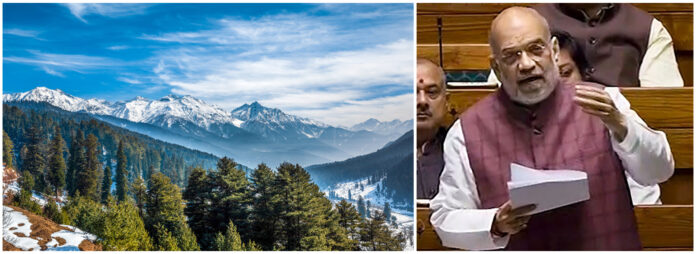In a significant address to the Parliament, Home Minister Amit Shah delved into the historical context of Jammu and Kashmir (J&K), shedding light on what he termed as the repercussions of mistakes made by India’s first Prime Minister, Jawaharlal Nehru. Shah’s speech focused on the intricacies of the region’s history, emphasizing how certain decisions made decades ago continue to impact the region today.
Nehru’s Legacy and J&K:
Amit Shah began by revisiting the era of India’s independence, highlighting the role of Jawaharlal Nehru in shaping the destiny of the nation. He argued that some decisions taken during that tumultuous time had far-reaching consequences, particularly in the case of Jammu and Kashmir. Nehru’s approach to handling the issue of accession, according to Shah, laid the groundwork for challenges that persist even today.
PoK and India’s Claim:
A pivotal point in Shah’s address was his unequivocal assertion that Pakistan-occupied Kashmir (PoK) rightfully belongs to India. He emphasized that the historical context surrounding the accession of J&K to India had been clouded by geopolitical complexities, and it was time to rectify historical injustices.
Nehru’s Blunders:
Shah did not mince words when attributing the challenges faced in J&K to what he termed as Nehru’s blunders. While acknowledging the complexity of the situation at the time of independence, the Home Minister argued that certain decisions, including the handling of Article 370, had far-reaching implications for the region.
Article 370 and Terrorism:
Amit Shah identified Article 370 as the root cause of terrorism in J&K. He argued that the special status granted to the state under this provision not only created a sense of separatism but also became a breeding ground for terrorism. The abrogation of Article 370 in 2019 was presented as a necessary step to address this longstanding issue.
Impact on Security:
The Home Minister delved into the security implications of historical decisions. He highlighted how the special status granted to J&K had hampered the integration of the region into the national fabric and had contributed to the prolonged security challenges faced by the state.
Call for National Unity:
Amit Shah concluded his address with a call for national unity, emphasizing the need to learn from historical mistakes and work together to secure the future of J&K. He underscored the importance of a united front in addressing the challenges faced by the region and fostering development and prosperity.
Conclusion:
In addressing the Parliament on J&K’s historical context, Amit Shah provided a comprehensive analysis of the region’s complex history. By linking present challenges to decisions made in the past, he sought to make a case for a more informed and united approach in addressing the issues faced by the people of Jammu and Kashmir. The speech sparked discussions across political lines, reigniting the debate on historical decisions and their lasting impact on the region.






















